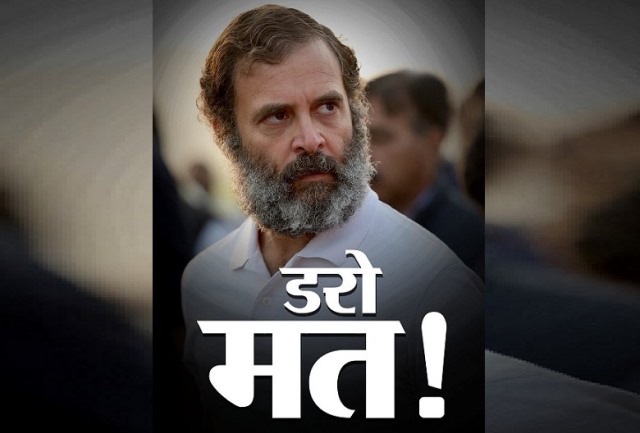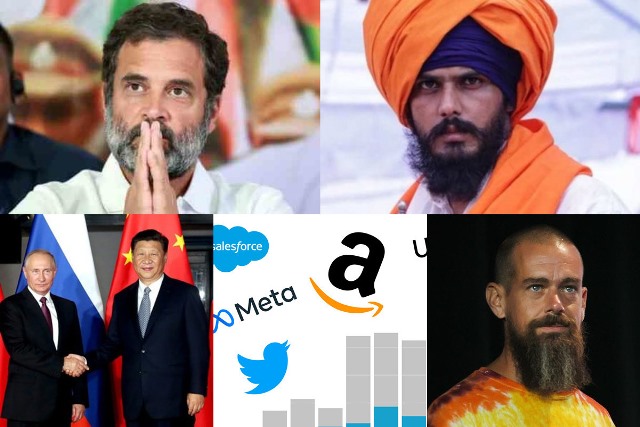“The creatures outside looked from pig to man, and from man to pig, and from pig to man again; but already it was impossible to say which was which… All animals are equal, but some animals are more equal than others… ”
– George Orwell, Animal Farm
“Rebellion cannot exist without a strange form of love.”
– Albert Camus
A cartoon by Sajith Kumar in Deccan Herald tells it all. A security guard outside the locked gates of what used to be the home of Rahul Gandhi, from where he was quickly ousted in what is being widely perceived as a petty and revengeful act, as he was from Parliament, makes a cryptic comment: “If we over do it, he will rent out a place in people’s hearts.”
If a cartoon can tell a thousand words like an epical moment captured in a sudden, photographic click, this eviction too seems to have clicked inside a million hearts. And these hearts seem to be beating with a rhythm which tells a story which is deeper than what we see and hear. There is something surely simmering in the air, and, as of now, undoubtedly, it is Advantage Rahul Gandhi!
There is no doubt that things are changing a bit too rapidly in contemporary India, since the stupendous success and mass support which captured the nation’s imagination during the Kanyakumari to Kashmir long march of the Bharat Jodo Yatra. The slogan of ‘Nafrat Choro Bharat Jodo’ and ‘Nafrat ke Bazaar mein khol rahe hain Pyaar ki Dukaan’ clicked like a pulsating heart-beat across the kaleidoscopic and vast ‘unity in diversity’ of this country’s geography, like a sublime song of eternal idealism which sticks to the inner being like a dream sequence – like a pure, untouched memory from childhood.
‘Daro Mat’, Rahul Gandhi said, his white and pepper beard adding charisma, wisdom and renunciation (tapasya) to his personality, lowering down the communal temperature in many parts of this pluralist, secular country, its fanatic polarisation, especially in the Hindi heartland, spiked by the octopus-like, hydra-headed, hate-filled fronts of Hindutva and its patrons in positions of power.
Not only that, many messages were reinterpreted in the mainstream being and consciousness: mass unemployment and universal impoverishment, back-breaking inflation and price rise, totally sell-out section of media, especially on TV, wallowing in vicious hate politics, the rise and rise of Adani and crony capitalism, the bad deal for farmers, the terrible, everyday life of deprivation for the poorest and jobless daily wagers, especially of women, the dreams and aspirations of the young, including in small towns and remote villages, and, of course, the tragedy of the mothers and daughters of the soldiers who died in Pulwama before the 2019 Lok Sabha polls. The messages were transparent.
The final, cinematic speech in Srinagar, under white streams of falling snow, with no umbrella, in frozen winter conditions, was as stirring and epical as the widely shared picture of Rahul Gandhi in his T-shirt, giving an enlightened, brave speech in falling rain during the yatra, even as twilight-darkness crept up into the massive rally.
No wonder, this one-dimensional regime, self-absorbed in self-love, with no love lost for peaceful dissenters and the minorities, was ‘shocked and awed’ – shaken from its absolute, hegemonic, haughty arrogance.
Since then, they have made one mistake after another, refusing to read the signs from inside India, and that emerging from the world, including the West, which, you can ignore at your own peril. The ban on BBC and the raid, boomeranged. It became global news. The documentary was now being openly watched by thousands of students and others as an act of defiance. Did nobody tell the ‘Acche Din Messiah’ that anything that is banned becomes more popular and tempting!
ALSO READ: Gandhigiri To Pushback Goondagiri
The title of the Hindenburg report said it all — Adani Group: How the World’s 3rd Richest Man is Pulling the Largest Con in Corporate History. Overnight, the meteoric and unbelievable business empire of the best buddy of the Great Helmsman crashed. Rahul Gandhi’s incredible speech in Parliament, and the national and international media coverage, exposed the last, stinking skeletons in the rotting cupboard.
Is this being all mere chance – not really it seems. There is a pattern to this inevitable predictability. There seems a method in this chain of coincidences.
That the largest democracy has become a “electoral autocracy” was a well-researched declaration by a European think-tank; this is a perception widely shared across the political and academic circles in the West, and, especially, among the ruling Democrats in America, more so, among the currently influential ‘socialist’ Bernie Sanders camp. Dismissing such perceptions with disdain and pseudo nationalist rhetoric is like declaring a stagnant quagmire as a garden of roses.
Look at this recent statement by the German government. “We have taken note of the verdict of first instance against the Indian Opposition politician Rahul Gandhi as well as the suspension of his parliamentary mandate. To our knowledge, Mr Gandhi is in a position to appeal the verdict. It will then become clear whether this verdict will stand and whether the suspension of his mandate has any basis. We expect that the standards of judicial independence and fundamental democratic principles will equally apply to the proceedings against Rahul Gandhi,” a German foreign ministry spokesperson has said.
The US state department had, earlier, said: “Respect for the rule of law and judicial independence is a cornerstone of any democracy, and we’re watching Mr Gandhi’s case in Indian courts, and we engage with the Government of India on our shared commitment to democratic values — including, of course, freedom of expression… In our engagements with our Indian partners, we continue to highlight the importance of democratic principles and the protection of human rights, including freedom of expression, as a key to strengthening both our democracies.”
In a recent report by Reuters, the signs are transparent: The annual US report on human rights practices listed “significant human rights issues” and abuses in India, including reported targeting of religious minorities, dissidents and journalists, the US State Department said. The findings come nearly a year after Secretary of State Antony Blinken said the US was monitoring what he described as a rise in human rights abuses in India by some government, police and prison officials, in a rare direct rebuke by Washington of the Asian nation’s rights record.
The report further says that Human Rights Watch has said that the Indian government’s policies and actions target Muslims while critics of Modi say his Hindu nationalist ruling party has fostered religious polarization since coming to power in 2014.
Meanwhile, it is bad news for all dictators and extremist power establishments. In the face of tens of thousands of people on the streets of Israel, everything from sea ports to airports to campuses and government offices shut, Bibi Netanyahu had to be airlifted in his own power turf, even as the police chief the Tel Aviv district and his own defence minister resigned in support of the protesters. Meanwhile, a reluctant and discredited Bolsonaro has finally gathered the courage to return to Brazil from Florida. And Donald Trump of the ‘Abki baar Trump sarkar’ fame, has been indicted by a Manhattan Court.
Check what seasoned journalist David Remnick rights about Trump in an essay called ‘An American Tragedy: Act III’ (The New Yorker, March 30, 2023): “Former President Donald Trump, twice impeached, yet impervious to shame, was indicted Thursday on criminal charges related to the payment of hush money to a porn star. There was a time in American history, almost impossible to recollect now, when such a sentence, such a plot point, would have been beyond our imagining. That has not been the case for a very long time… In early 2016, the ascent of such a clownish demagogue, a sleazy real-estate hustler who had only begun to reveal the full depths of his bigotry and authoritarian impulses, was a laugh line…”
Indeed, there are lessons for India and its political establishment, and all politicians across the spectrum, in all countries. Nothing is permanent. Not even power, privilege and pelf. All is ephemeral. Including, Acche Din…

